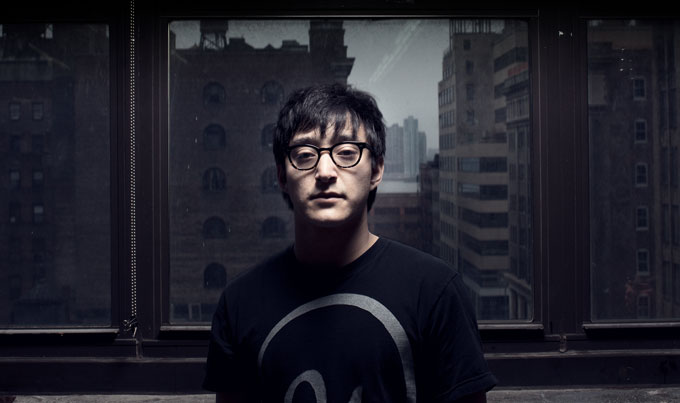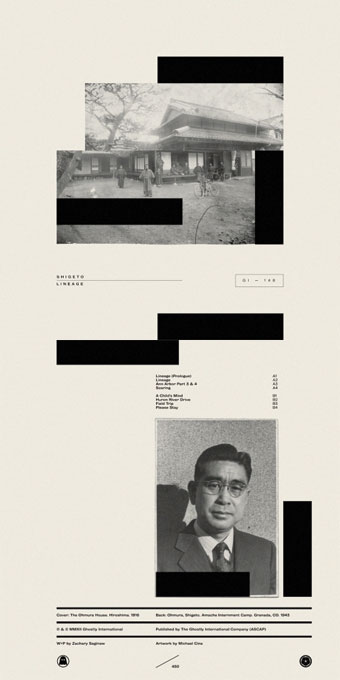Lineage
by Cory Perla

Sometimes it feels like the electronic dance music scene has lost some substance, but then an artist like Zach Saginaw, a.k.a. Shigeto, comes along and puts out a piece of music so personal and genuine that it revitalizes a genre. That record is Lineage, his latest “mini LP” released last month on Ghostly International. Saginaw uses his instinctual drumming skills to combine live percussion with jazz structures, hip-hop tempos, and atmospheric flares that sonically express the sorrowful story of his ancestors, including his great-grandfather Shigeto. This week I chatted with the Ann Arbor, Michigan native about his live performance style, the meaning behind Lineage, and the source of his urbanized soundscapes, as he worked on a new track at his home in Brooklyn.
AV: How is your family history important to your music?
Zach Saginaw: Music has always been a passion of mine, but it’s become my work as well. It has become a platform for me to actually say something. Even though I’m not on a huge level when it comes to popularity, I now have a group of people who listen to my music and who I can communicate with through my music and social networks. I feel like I’m lucky to have this sort of power; it’s the best way for me to thank my family, in a way. [Lineage] is not like this huge musical statement; it’s a personal statement. It’s like, “Look, here is what I’m doing and you’re a part of it.”
It’s not always going to be that way, it’s not like every release is going to be some deep family shit. I’m trying to just be me. I think you can go about being an artist in many ways. I think you can create an alias for yourself, and you are this alias playing a role—someone like Madonna or Marilyn Manson. These are extremes. Or you can be exactly who you are. For me it is very hard to be something else. It’s easier for me to be sweating and playing the drums and showing the people who are watching me how much I care about that, rather than being a persona on stage.

AV: I really like the cover art for Lineage. It seems very personal. Can you tell me a little bit about the artwork and how it relates to the themes you were just talking about?
ZS: Something that has always affected me in life is the mix of who I am. Originally, my dad’s side comes from Russia—they’re Russian Jews—and they came to Detroit. My mother is Japanese and her ancestors came from Hiroshima, Japan. Everyone on my mom’s side of the family were living in California during World War Two, and they were part of the thousands of people who were put into the internment camps. Long story short, that experience killed the Japaneseness in my family line. There was so much shame and trauma associated with that experience, that they came out of that trying to be as American as possible, even if it was unconscious. That is why I don’t speak Japanese. I feel very American. I feel disconnected from that part of my culture, so that is why I dedicated this release to them. The photo [on the album cover] is of my family in Hiroshima in 1916. My great-grandfather—who is Shigeto, who I’m named after—is on the back cover. It is a picture of him that was taken while he was in an internment camp. It’s some heavy shit, but it’s not supposed to be some dark album, it’s just supposed to be like, “This is my lineage.”
AV: To me the most interesting part of your music is how you combine live instrumentation and electronics. When I listen to your recordings though, it is hard for me to decipher what is live and what is electronic. Can you tell me about your writing process?
ZS: Basically when I was writing the stuff for [his debut full-length record] Full Circle, I didn’t own a lot of instruments, so a lot of the samples were from outside sources. Sometimes it was me playing an instrument at a music store or at a friend’s house with an iPhone. I wasn’t really anticipating releasing it. I had written a lot of the material before Ghostly picked me up. With Lineage, over the course of the last two years, I’ve invested a lot in musical instruments, like a Rhodes, a harp, and a xylophone, stuff like that. With Full Circle, I was attempting to capture this organic sound, but with Lineage I was actually playing instruments and recording at my studio at home. There were a lot more carefully chosen sounds.
AV: You must have had a lot of audio to sift through when started to put Full Circle together. What types of sounds inspired you?
ZS: I like the sounds of every day life; they work well as textures. Living in New York, there are constantly musicians playing in the subways, there is traffic, and the sound of trains. Back in Michigan there is the breeze and the trees. I like to do a lot of my recording while I’m traveling because I’m somewhere different and I’m inspired. I’m looking for it. I’m looking for something to take a picture of or record.
AV: So you’re influenced by your surrounding environment and organic sounds, but what influences you musically?
ZS: So much. I grew up with the influence of jazz musicians: Miles, Coltrane, Charlie Parker. I’m super influenced by Aphex Twin and Squarepusher. They were the first electronic musicians I got into, like a lot of the people in my generation growing up. I grew up listening to a lot of hip-hop and rap too: A Tribe Called Quest, mainly East Coast stuff. I work in an emotional maze, so when I have a real connection with a musician—if I know them, if I know what they’re like as a person—I tend to get into their music more. I’m interested in a lot of music from Michigan, too. Dabrye, Matt Dear, the whole original Ghostly roster has been a huge influence on me, too, so it’s cool to end up with them.
AV: How do you think you fit in with the rest of the Ghostly lineup?
ZS: I don’t really think I fit in, but at the same time I think that is what Ghostly is kind of known for—having this wide variety of electronic music. The thing that brings it all together is the electronic aspects of the artists. You look at the roster now and it’s everything from School of Seven Bells, to me, to Com Truise. There is techno, electro, ambient stuff, so I think I fit in for being my own thing, kind of.
AV: Are you a drummer at heart?
ZS: Yes. I started playing drums really young. It’s definitely my comfort zone. When I decided to start playing live I knew I wanted the drums to be a part of it, but earlier in my production life I didn’t know how I wanted to incorporate it in the actual songs.
AV: When did you make the transition into writing more electronic-based stuff?
ZS: I was living in London from 2003 to 2007, just working and playing jazz gigs. I got tendonitis in my forearm from a combination of work and playing the drums. So there was a period when I couldn’t play drums at all, and it was super dark and I was super depressed. My brother actually gave me a copy of Reason 2.5 and I really really liked it.
AV: So you were almost forced into it?
ZS: Yeah, kind of. It was like, “You need to do something creative and you can’t play drums, so what are you going to do?”
Shigeto performs live with fellow Ghostly International artist Mux Mool this Friday, March 2 at Soundlab (110 Pearl Street).
blog comments powered by Disqus|
Issue Navigation> Issue Index > v11n9 (Week of Thursday, March 1) > Lineage This Week's Issue • Artvoice Daily • Artvoice TV • Events Calendar • Classifieds |









 Current Issue
Current Issue